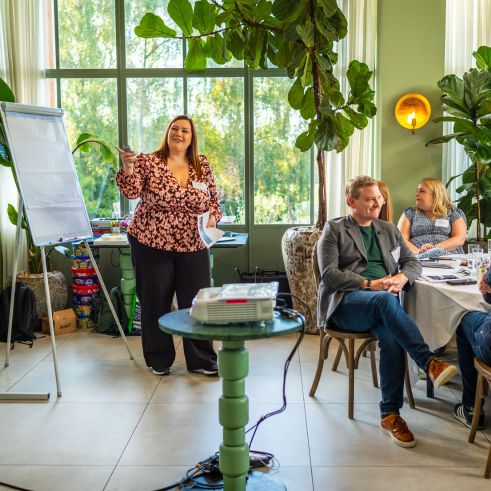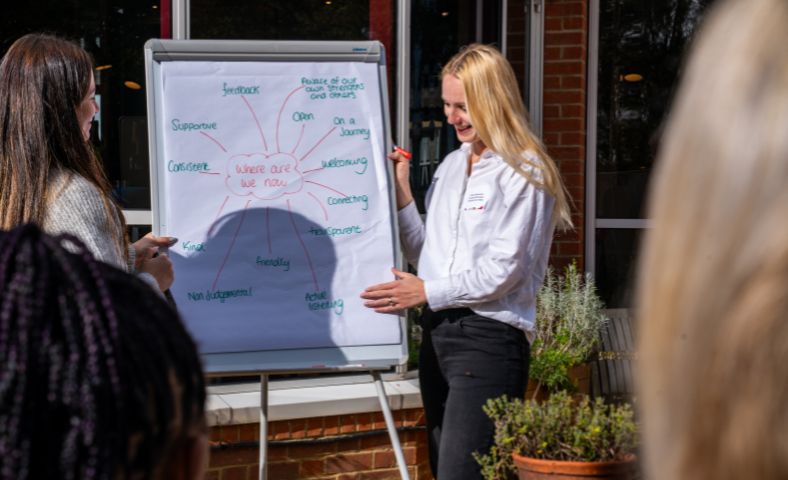
Career progression in early years education
As an early years educator, you can open doors to new opportunities for both professional and personal development. You can advance financially, reignite your passion, and follow a career path that fits your circumstances and goals.
By working with young children, you’re making a lasting impact on their lives, and you deserve a career that acknowledges your dedication and supports your growth.
Let’s talk about career progression in early years education and discuss how it opens up new experiences, opportunities to develop your skills, and the chance to thrive in your role.
Becoming an early years educator
A career in early years teaching begins with education, training, and skills development.
Education and training
Your education and training act as the foundation of your career in early years teaching.
After obtaining a minimum of C grades in 4 or 5 subjects, including Maths, English, and Science GCSEs (or equivalent qualifications), you can complete an undergraduate degree in a subject related to early childhood studies or child development.
You can move on to postgraduate training or take an Early Years Initial Teacher Training (EYITT) course after completing your first degree.
Another pathway is to work your way into this role by starting as a nursery worker or teaching assistant while pursuing a part-time degree.
Soft skills
Early years educators are most supportive, engaging, and effective in their role when they possess certain soft skills. These skills are personal qualities that help you better interact with young children and create a nurturing learning environment.
Optimal soft skills in early years education settings include:
- Communication
- Patience
- Positively
- Problem-solving
- Observation
- Empathy
- Creativity
- Emotional intelligence
- Organisation
You can build each soft skill through regular self-reflection and observing others. You can also attend various workshops throughout the UK to develop these skills further. These workshops often offer practical strategies and techniques to help you apply soft skills in real-life situations during your day-to-day responsibilities.

Advancing in early years education
In early years education, there isn’t just one way to progress. You can follow a classic step-by-step route or take alternative paths depending on your interests and strengths.
The standard development route typically begins with roles like Apprentice Educator and Educator, then moves through to Senior Educator, Room Manager, Deputy Manager, Nursery Manager, and on to more senior leadership roles like Senior Nursery Manager and Regional Director.
There are also alternative development routes that open up opportunities to specialise or pivot based on what suits you.
For example, you might move from a Room Manager role into becoming an Early Years Teacher, Forest School Lead, or even an Education Advisor. Others step into support-based leadership roles, such as Support Deputy Manager or Support Manager, eventually reaching senior roles without following the traditional management route.
While our early education career pathway map doesn’t show every possible route, it highlights that growth can happen in many directions, and there are plenty of different options for finding fulfilling and rewarding work in the sector.
Shaping your career to fit your life
As well as not having any single set path to follow, career progression in early years education also doesn’t always have to follow a straight ladder to the top.
For many educators, ‘success’ means finding a role that fits their lifestyle or goals and not achieving a specific title.
After some time working in the sector, you might decide that you want to switch up your schedule to better align with your other commitments or changing needs.
Flexible working in the early years sector is becoming more common, and at N Family Club, we offer options like flexi-bank jobs, where your work can fit around your life rather than the other way around.
We provide flexible working opportunities for all roles because we believe that a healthy work-life balance leads to happier, more engaged educators.
At our nurseries, N educators can reach the title they want, such as a teacher, manager, or another role, while still having the opportunity for flexible working.
Regardless of where you are or where you want to be in your career, we’ll provide the flexibility you need to excel in all areas of your life and create the work/life balance.
Continuous professional development in early years education
In early years education, it’s important to keep developing your skills and knowledge. Staying on top of these changes and new approaches in the field helps you give the best care and education to children.
On top of that, improving your skills can speed up your career progression and help you figure out where you want to go next. If you’re looking to grow in your current role or explore new opportunities, there are different ways to continue learning.
You can attend workshops, take courses, or join conferences to learn new techniques and meet others in the field. These experiences are a great way to build up your knowledge and find inspiration for your next career step.
You’ll also have the chance to reflect on your career goals.
For instance, if you’re thinking about moving into a leadership position or specialising in a specific area, professional development can help you get there faster. Or, if you’re interested in working with specific age groups or focusing on early childhood education methods, continued learning can help you gain the expertise needed to make that shift.
Whatever your goals are, regular reflection, learning, and development keep your career exciting and ensure you’re always progressing toward what matters most to you.

Charlie, our room manager from N Moseley, attended the Room manager leadership development programme. Here is what she had to say about the experience:
‘Over the course of 8 weeks, Jessica and Chloe introduced me to my Clifton Strengths, highlighted the differences between being a leader and a manager and developed our confidence so that in the final week, we felt confident to present to a room of our peers. This programme not only allowed me to learn through taught content, but it has also helped create a network of room managers whom I can go to if in need of inspiration. I have applied for the deputy manager development programme and will continue to look at the monthly training calendar for any other training opportunities that I feel will benefit myself or my team.’
Progressing in your early years education career
Moving forward in your career in early years education is all about continuous growth, learning, and finding the path that works best for you. With the right education, training, and a bit of flexibility, you can build a fulfilling, long-term career.
Interested in pursuing or advancing your career as an early years educator? Check out some of our Nursery Educators Jobs and start your journey with N Family Club today!

